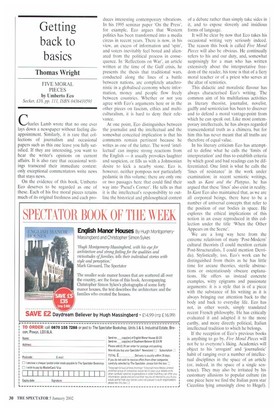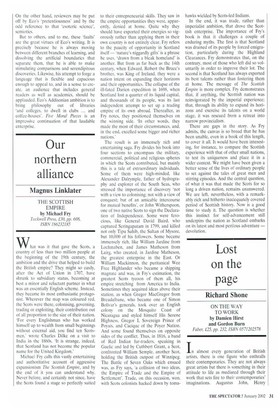Getting back to basics
Thomas Wright
FIVE MORAL PIECES by Umberto Eco Seeker, £10, pp. 111, ISBN 0436410591 Charles Lamb wrote that no one ever lays down a newspaper without feeling disappointment. Similarly, it is rare that collections of journalism and occasional papers such as this one leave you fully satisfied. If they are interesting, you want to hear the writer's opinions on current affairs. It is also rare that occasional writings transcend their immediate context: only exceptional commentators write news that stays news.
On the evidence of this book, Umberto Eco deserves to be regarded as one of these. Each of his five moral pieces retains much of its original freshness and each pro
duces interesting contemporary vibrations. In his 1995 seminar paper 'On the Press', for example, Eco argues that Western politics has been transformed into a media circus in recent years. There is now, in his view, an excess of information and 'spin', and voters inevitably feel bored and alienated from the political process in consequence. In 'Reflections on War', an article written at the time of the Gulf crisis, he presents the thesis that traditional wars, conducted along the lines of a battle between nations, are completely anachronistic in a globalised economy where information, money and people flow freely between countries. Whether or not you agree with Eco's arguments here or in the other pieces on fascism, ethics and multiculturalism, it is hard to deny their relevance.
At one point, Eco distinguishes between the journalist and the intellectual and the somewhat conceited implication is that his comments remain pertinent because he writes as one of the latter. The word 'intellectual' can inspire strong reactions from the English — it usually provokes laughter and suspicion, or fills us with a Johnsonian desire to kick a nearby stone. Eco is. however, neither pompous nor particularly pedantic in this volume; there are only one or two passages here that could find their way into `Pseud's Corner'. He tells us that it is the intellectual's responsibility to outline the historical and philosophical context
of a debate rather than simply take sides in it, and to expose slovenly and insidious forms of language.
It will be clear by now that Eco takes his occasional writing very seriously indeed. The reason this book is called Five Moral Pieces will also be obvious. He continually refers to his and our duty, and, somewhat surprisingly for a man who has written extensively about the interpretative freedom of the reader, his tone is that of a fiery moral teacher or of a priest who serves at the altar of semiotics.
This didactic and moralistic flavour has always characterised Eco's writing. The common aim of his multifarious activities as literary theorist, journalist, novelist, gadfly and semiotician has been to discover and to defend a moral vantage-point from which he can speak out. Like most contemporary intellectuals, he has always regarded transcendental truth as a chimera, but for him this has never meant that all truths are therefore of equal value.
In his literary criticism Eco has attempted to define what he calls the 'limits of interpretation' and thus to establish criteria by which good and had readings can be differentiated. One limit is what he calls the 'lines of resistance' in the work under examination; in recent semiotic writings, such as Kant and the Platypus, he has argued that these 'lines' also exist in reality. In Kant Eco also maintained that, as we are all corporeal beings, there have to be a number of universal concepts that refer to the position of our bodies in space. He explores the ethical implications of this notion in an essay reproduced in this collection under the title 'When the Other Appears on the Scene'.
We are a long way here from the extreme relativism of many 'Post-Modern' cultural theorists (I could mention certain Post-Structuralists, I could mention Derrida). Stylistically, too, Eco's work can be distinguished from theirs as he has little time for arcane theories, sterile abstractions or ostentatiously obscure explanations. He offers us instead concrete examples, witty epigrams and passionate arguments: it is a style that is of a piece with the substance of his writing as it is always bringing our attention back to the body and back to everyday life. Eco has not, in other words, simply translated recent French philosophy. He has critically evaluated it and adapted it to the more earthy, and more directly political, Italian intellectual tradition to which he belongs.
If the reception of Eco's previous books is anything to go by, Five Moral Pieces will not be to everyone's liking. Academics will object to his 'arrogant' and 'journalistic' habit of ranging over a number of intellectual disciplines in the space of an article (or, indeed, in the space of a single sentence). They may also be irritated by his customary allusions to popular culture (in one piece here we find the Italian porn star Ciccolina lying amusingly close to Hegel). On the other hand, reviewers may be put off by Eco's 'pretentiousness' and by the odd reference to that 'esoteric science', semiotics.
But to others, and to me, these 'faults' are the great virtues of Eco's writing. It is precisely because he is always moving between different branches of learning, and dissolving the artificial boundaries that separate them, that he is able to make stimulating comparisons and serendipitous discoveries. Likewise, his attempt to forge a language that is flexible and capacious enough to appeal to, and in a sense to create, an audience that includes general readers as well as academics, should be applauded. Eco's Addisonian ambition is to bring philosophy out of libraries 'and colleges, to dwell in clubs ... and coffee-houses'. Five Moral Pieces is an impressive continuation of that laudable enterprise.























































 Previous page
Previous page